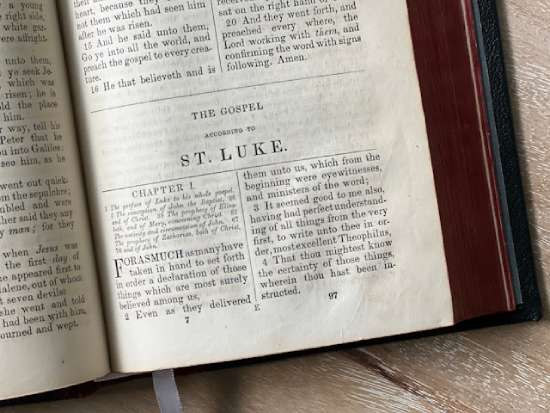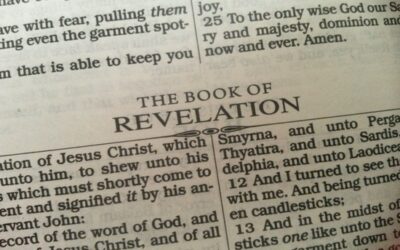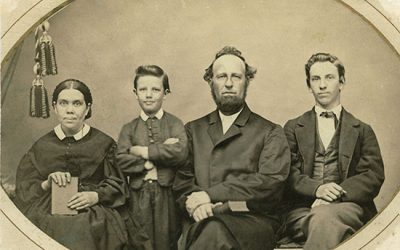Have you ever traced your genealogy back several generations? Did you ever try to find out if your ancestors did anything famous (or infamous)?
This kind of interest has grown even more in recent years, now that we have sophisticated software and DNA tests to help us find out all the hairy details about our family lines. It can be surprisingly fun (and sometimes shocking or emotional) to find out which people, events, or parts of history we’re connected to, and how.
Obviously, the scribes of Bible times didn’t have this technology. But clearly they knew this information would be important, since they made careful effort to document the headlining details of the Israelite line from Adam to Noah to Abraham to David…all the way to the birth of Jesus.
When we get to the genealogy of Jesus Christ in the New Testament, we see that Matthew and Luke took the same painstaking effort to trace the generations all the way to the beginning of the Old Testament. And this list of lineage contained a wide variety of people—kings, prostitutes, prophets, and illegitimate children.
Matthew’s documentation of the family line Jesus was born into (Matthew 1:1-16) starts with the patriarch of the Hebrew nation—Abraham—and includes 41 names. Luke’s record (Luke 3:23-38) stretches clear back to Adam and includes 77 names.
So who were some of these people? Did they do anything important? And why did Matthew and Luke make sure to include Jesus’ genealogy in their Gospel accounts?
Let’s get more details from Scripture. We’ll cover:
- The significance of genealogy in a biblical context
- The significance of Jesus’ genealogy
- How Jesus’ genealogy fulfills prophecy
- Reflecting on Jesus’ genealogy
To help us get the bigger picture, let’s look at why the tracking of genealogy was so important to the Israelites.
The significance of genealogy in a biblical context

Photo by Tima Miroshnichenko
Throughout the Bible, we can see how a person’s status and life opportunities greatly depended on their family tree. It reflected their “domestic, political, and religious relationships,” and was proof of inclusion in the tribes of Israel.1
So if you lived during Old Testament times, your lineage would determine:
- If you inherited land (Numbers 27:8-11)
- Who you could marry (Numbers 36:3-4)
- Whether you could become a priest, since you had to prove you were from the Levite tribe and descended from Aaron (Numbers 3:10)
Participation in many Israelite rituals, ceremonies, and traditions required that a person was truly an Israelite, whether by birth or by other legal means.2
Also, the Israelites had been promised a Messiah. Part of this prophecy included the family line that the Messiah would be born into, so tracking these familial details would help Israel identify Him and realize that prophecy was being fulfilled.3
Let’s look more closely at this family line that led to Jesus’ birth.
Jesus’ genealogy
If you look at the two genealogy accounts in Matthew and Luke, you may notice some differences between them. Let’s go over those first.
Comparing genealogy accounts

Photo by Tim Wildsmith on Unsplash
While Matthew and Luke’s lists contain many of the same names, they differ widely on which names, how many names, and how far back the genealogical line is traced. It’s likely that they were each emphasizing different things that would be meaningful to their intended audiences.
As noted above, Matthew’s genealogy takes the line back to Abraham, the father of the Israelites. Luke, on the other hand, traces the genealogy clear back to the very beginning of humanity—Adam.
Matthew stops at Abraham because he was writing to an audience of Jews, aiming to provide confirmation that Jesus was indeed the Messiah as prophesied. So he focused on the beginnings of the Israelite nation.4 And Abraham was the one through whom God promised innumerable descendants (Genesis 15:5) with a special mission to represent God to everyone on earth (Genesis 22:17-18).
Luke was writing more for the Greek Christians, who wouldn’t be as familiar with Hebrew history. He used a longer genealogy to emphasize Jesus’ significance in prophecy and His role for humanity.
However, if you look closely at the two genealogies, you’ll notice something interesting: In the generations between Joseph (Jesus’ earthly father and husband of Mary) and King David, the names widely differ. How could one person have two different sets of ancestors?
Scholars continue to discuss the exact reasons, but it’s generally thought that one focuses more on Joseph’s line, and the other on Mary’s. Here’s what The Seventh-day Adventist Bible Commentary has to say about it:
“Two plausible explanations have been proposed, either of which is fully in harmony with known Jewish customs. According to one explanation, both lists give the ancestry of Joseph, the one by blood descent and the other by adoption or by levirate marriage [Deuteronomy 25:5-9]. According to the other explanation, Matthew gives the ancestry of Joseph, and Luke gives that of Mary, through her father.”5
An interesting aspect of the Israelite genealogy system was adoption. If you were adopted by a family, you were considered the same as a biological child to your adoptive parents, becoming a legal heir.6 So in the example above, it’s also possible that Joseph’s father may have died and he was adopted, thus giving him two genealogies.
This was similar for levirate marriage, where a man could be duty-bound to marry the sonless wife of his deceased brother. All of their subsequent children would be considered the wife’s first husband’s to preserve the family line.7
In the Old Testament, an example of the levirate marriage system include Judah and Tamar. Judah brought Tamar to be a wife for his oldest son, Er. But Er died, so Judah gave Onan, his next son, as Tamar’s husband. Onan also died, and then Judah was to promise his youngest son to Tamar (Genesis 38:6-11).
Another example is Ruth and Boaz. Ruth’s husband, Mahlon, had died, and he had no brothers for her to marry. So Mahlon’s nearest relative, Boaz, married her (Ruth 1:11; 2:1, 9).
You may also notice that Luke’s genealogy includes many more names than Matthew’s.
The Seventh-day Adventist Bible Commentary suggests that by comparing Matthew’s genealogy to other biblical lists, we can see he left out many names in different segments of Bible time.8
With Matthew’s intended readership being more familiar with Hebrew history, he may have intentionally left some names out that weren’t necessary for the emphases he wanted to make about the Israelite royal bloodline.
It’s evident that Luke, however, wanted to give a comprehensive history and included all the names, regardless of their level of familiarity or significance.
We can see this when we hold up Luke’s and Matthew’s lists side by side.
Noteworthy people in Jesus’ genealogy
Jesus’ ancestors are traced back to Abraham in Matthew 1 and Adam in Luke 3.
These lists of ancestors include several significant, well-known figures from the Bible, such as:
- Adam: The first man lived in the Garden of Eden with his wife Eve, before they disobeyed God and were expelled from the Garden.
- Enoch: A descendant of Adam’s son, Seth, Enoch was known for his high moral character and being a loyal follower of God. God later took Enoch to heaven before the man died.
- Noah: Noah warned the people about a worldwide flood and built an ark, as per God’s instructions, to house people and animals until the flood was over.
- Abraham: Abraham is considered the father of a few religions, including Judaism, Islam, and Christianity. God promised him that his descendants would be as numerous as the stars of the sky (Genesis 15:5).
- Jacob: Jacob comes from a story of family tension and sibling rivalry, but later of faith, redemption, and forgiveness (you can read the story of Jacob and Esau in Genesis 27). Jacob was renamed to Israel by God, and his 12 sons became the 12 tribes of Israel.
- Rahab: A former prostitute living in Jericho, Rahab was rescued for her loyalty to Israel when the Israelites destroyed the city (Joshua 6:21-23).
- Ruth: This courageous Moabite woman left everything to live with her mother-in-law, Naomi, in a foreign country. She and her husband Boaz were the great-grandparents of King David.
- King David: The second king of a united Israel, David was considered a man after God’s own heart (1 Samuel 13:14). Despite this, he was far from perfect. At his lowest point, he committed murder and adultery. His confession and repentance inspired some of the Psalms he wrote. (Read more in 1 Samuel, 2 Samuel, 1 Kings, and Psalms.)With all these major events and renowned names documented in these lists, it’s easy to see why they are so important in the study of prophecy and its fulfillment.
Now let’s look at passages of prophecy that relate to Jesus’ family line.
How Jesus’ genealogy shows the fulfillment of prophecy
By reading through the genealogy of Jesus, we can track and confirm multiple details that are specified in prophecies about Him.
The Son of God as the “Son of Man”

Photo by Greyson Joralemon on Unsplash
This phrase is used to describe Jesus in both Psalms 8:4-6 and Daniel 7:13. Jesus refers to Himself as the “Son of Man” many times during His ministry (Mark 2:28, Luke 5:24, Luke 21:27).
Jesus’ genealogy shows how He, the Son of God, became the Son of Man—by being born into an existing human bloodline as the son of Joseph and Mary. Luke tracks Jesus’ line to Adam, the first human, and through whom sin was introduced to the world. Jesus would fulfill that need for a rescuer from sin by living a sinless life as the second Adam (Genesis 3:15; Romans 5:14; 1 Corinthians 15:45).
This helps show His voluntary, sacrificial role in offering salvation for humanity. Though He is divine, He set aside His divinity to live among humanity, fully at the mercy of the same circumstances and temptations that confront us in our lives (Matthew 3:16-17, John 17:5, Matthew 17:5).
From the tribe of Judah
Jesus was also prophesied as coming from the tribe of Judah in Israel.
On his deathbed, Jacob (or Israel) predicted this about Judah:
“The scepter shall not depart from Judah, nor a lawgiver from between his feet, until Shiloh comes; and to Him shall be the obedience of the people” (Genesis 49:10, NKJV).
Both Matthew and Luke’s genealogies connect Jesus to this tribe.
Branch of Jesse, line of David
In Isaiah 11:1, we read that the Messiah will come from a branch off of the “stem of Jesse” (NKJV).
And Luke 2:4 says Joseph went to Bethlehem for the census because “he was of the house and family line of David” (CSB).
So both lists make it clear that Jesus did indeed descend from Jesse and David:
“Jesse begot David the king” (Matthew 1:6, NKJV).
“The son of David, the son of Jesse” (Luke 3:31-32, NKJV).
Son of David
Continuing with the significance of David, Jesus is also called the “Son of David.” In the Gospel of Matthew, this title appears frequently (Matthew 12:23; 15:22; 20:30, for example).
This prophecy comes from 2 Samuel 7:12-16. Here, the prophet Nathan tells David that his family and descendants will be established forever (2 Samuel 7:12, 16).
This was a reference to the spiritual kingdom Jesus would bring—one that is eternal. We see this in how Jesus, a descendant of David, set up His heavenly kingdom forever by defeating sin through His death on the Cross.
Reflecting on Jesus’ genealogy
The genealogy of Jesus shows us how Jesus had no advantages or privileges during His earthly ministry. All kinds of people and families populate His family tree. We get a better understanding of the circumstances and significance of His human existence.
We see that He came from a long line of people who were chosen to represent God and bless the world, but often failed to do this. But even so, through God’s patience and mercy, prophecy was fulfilled despite the Israelites’ tumultuous history.
We also see diversity in the human bloodline of Jesus. It’s full of names that vary in status, wealth, occupation, etc. It reinforces how Jesus both represented the whole of humanity, and also came to save all of humanity.
- Rahab was a prostitute, but helped the Israelites and converted (Joshua 6:25)
- Jacob’s early life was full of family tension, deception, and dishonesty, but he became the father of the 12 tribes of Israel (Genesis 30:27-43)
- Enoch was so close to God that he never died and was taken to heaven (Genesis 5:24)
- Methuselah was the longest-lived human recorded in Scripture (Genesis 5:27)
- Abraham and Samuel were influential prophets (Genesis 22; 1 Samuel 13:14)
- David, Solomon, Asa, Hezekiah, Josiah, and Jehoshaphat were faithful kings
- Manasseh was a king who strayed from God, practiced witchcraft, and led Judah into idolatry (2 Chronicles 33:1-6)
- Ruth was originally from Moab, but refused to leave her Israelite mother-in-law and became a part of Israel’s history (Ruth 1:16-18)
- Noah demonstrated his faith in God by spending almost 120 years building the ark before the Flood actually began (Genesis 6:3, 14)
Jesus had a little bit of everything in his family line. His incarnate birth was into a working-class family from a small town of poor reputation. Yet His genealogy could be considered a royal line because of the kings of Israel and Judah it included. But there were also individuals who led His people astray in destructive ways.
Long story short, His human family history represented a diverse spectrum of personalities and circumstances—rich, poor, faithful, rebellious, royal, common, revered, despised, powerful, weak, etc. Any of us could relate to at least one piece of that messy yet inspiring history.
And that’s the real point. There isn’t one type of person, family, or race of people that have more of God’s favor than others. Regardless of history, pedigree, prestige, or anything about our genetic makeup, we’re all adopted into Christ’s family and can become His heirs (Galatians 4:4-5, Romans 8:17).
We’re already His children, and He’s already our Messiah and Savior. All we have to do is accept His gift to us.
Interested in learning more about the human life and ministry of Jesus?
Comparing the Genealogy of Jesus in Matthew to Luke
Listed below are both genealogies of Jesus from Matthew and Luke, with names that coincide bolded.
Matthew’s genealogy (Matthew 1:1-16):
- Abraham
- Isaac
- Jacob
- Judah
- Perez
- Hezron
- Ram
- Amminadab
- Nahshon
- Salmon
- Boaz
- Obed
- Jesse
- David
- Solomon
- Rehoboam
- Abijah
- Asa
- Jehoshaphat
- Joram
- Uzziah
- Jotham
- Ahaz
- Hezekiah
- Manasseh
- Amon
- Josiah
- Jeconiah
- Shealtiel
- Zerubbabel
- Abiud
- Eliakim
- Azor
- Zadok
- Achim
- Eliud
- Eleazar
- Matthan
- Jacob
- Joseph
- Jesus
Luke’s genealogy (Luke 3:23-38):
- God
- Joseph
- Adam
- Judah
- Seth
- Simeon
- Enosh
- Levi
- Cainan
- Matthat
- Mahalal Jorim
- Jared
- Eliezer
- Enoch
- Jose
- Methusaleh Er
- Lamech
- Elmodam
- Noah
- Cosam
- Shem
- Addi
- Arphaxad
- Melchi
- Cainan
- Neri
- Shelah
- Shealtiel
- Eber
- Zerubbabel
- Peleg
- Rhesa
- Reu
- Joannas
- Serug
- Judah
- Nahor
- Joseph
- Terah
- Semei
- Abraham
- Mattathiah
- Isaac
- Maath
- Jacob
- Naggai
- Judah
- Esli
- Perez
- Nahum
- Hezron
- Amos
- Ram
- Mattathiah
- Amminadab Joseph
- Nahshon
- Janna
- Salmon
- Melchi
- Boaz
- Levi
- Obed
- Matthat
- Jesse
- Heli
- David
- Joseph
- Nathan
- Jesus
- Mattathah
- Menan
- Melea
- Eliakim
- Jonan
Related Articles
- Ray, Paul, Jr., PhD. “The Role and Functions of the Biblical Genealogies,” Andrews University, 2016. [↵]
- Ibid. [↵]
- “The Importance of Messianic Genealogy.” [↵]
- Finley, Mark A. “Amazed at Bethlehem,” Adventist Review, December 22, 2010. [↵]
- The Seventh-day Adventist Bible Commentary, Notes on Luke 3:23. [↵]
- Ibid. [↵]
- Kilchör, Benjamin, “Levirate Obligation in the Hebrew Bible,” Oxford Bibliographies, March 23, 2022. [↵]
- The Seventh-day Adventist Bible Commentary, Notes on Luke 3:23. [↵]
More Answers
What Day Is the Sabbath, and How Do We Know?
The Sabbath is a declaration of weekly rest by God which we find in the Bible (Genesis 2:2-3). But you may be wondering:
Why Do Some Bibles Have More Books Than Others?
Christians consider the Bible as their sacred writings. But within Christianity, different denominations use Bibles with different numbers of books.
Can We Find Jesus Christ In the Old Testament?
Yes, you might be surprised to know that there are hundreds of verses in the Old Testament about Jesus.
What the Bible Says About Resolving Conflicts
While it’s the main ingredient in a good story, it unfortunately can spoil things in real life. It might start from minor differences of opinion. But unchecked, it can turn into what feels like a full-blown war.
The Benefits of A Seventh-day Adventist Academy
Adventist academies are high schools (grades 9-12) that are owned and operated by the Seventh-day Adventist Church.
Are Seventh-day Adventists Christians?
Yes, the Seventh-day Adventist Church is a Protestant Christian denomination formed in 1863. Just like other Christians, we believe that Jesus Christ is our Savior and seek to follow the principles of the Word of God.
Adventist Movies: Where Faith and Film Meet
The Adventist Church uses film to share our faith and uplift positive values. Learn more about specific Adventist-produced films and where to find them.
Does the Bible Teach Predestination?
your choices, actions, and habits really matter to your eternal destiny? Or is the path you choose in life predetermined, and your life is just following a script that’s been laid out for you?
The Seven Churches of Revelation and What They Mean
The seven churches were churches that received messages from Jesus Christ through the apostle John while he was exiled on the island of Patmos. These letters are in chapters 2 and 3 of Revelation.
Do Adventists Celebrate Christmas?
In general, most Seventh-day Adventists do celebrate Christmas.
Since our denomination doesn’t have specific guidelines about holidays, it’s up to each member to decide whether to celebrate it based on their personal convictions and study of the Bible.
How Can I Know Ellen White’s Messages Were From God?
It’s natural to be a bit skeptical when you hear about someone being “divinely inspired,” or that something is a “message from God,” etc. And we expect nothing different if you’re hearing about Ellen White, an influential co-founder of the Seventh-day Adventist Church, for the first time. After all, the Bible tells us that we’re supposed to test these things!
Ellen G. White’s Time in Australia
Ellen White traveled to Australia in the later part of her life, and she ended up spending nine years there. In that time, she helped the Australian Seventh-day Adventist Church increase in size and strength.
Ellen G. White’s Time in Europe
When the Seventh-day Adventist Church was still young, a council of the church in Europe requested Ellen White, one of Adventism’s key leaders, to come to Europe. Despite the many obstacles, God led her there to help the new churches and members for two years.
Ellen G. White’s Travels and Worldwide Mission
Though Ellen White, a co-founder of the Seventh-day Adventist Church, is best known for her ministry in the United States, she also traveled to twelve other countries in her lifetime—a big accomplishment in the 19th century when travel was strenuous and long.
Ellen G. White’s Counsel on College Education
Ellen G. (Harmon) White, a significant co-founder of Adventism, is often known for her practical and spiritual guidance for proper childhood education. But she was also significantly involved in the development of Seventh-day Adventist higher education.
8 Pieces of Advice from Ellen White’s Counsel for Families
In this article, we’ll look at the insight Ellen White received from God. We’ll cover 8 major themes she highlighted for families.
Was Everything Ellen White Said Divinely Inspired?
The Seventh-day Adventist Church believes that many of Ellen White’s messages were inspired by God. But that doesn’t mean everything she ever said was prophetic, or meant to be taken as direct instruction from God. So let’s break down how to identify the nature of her many written messages and quotes.
Who Were Ellen White’s Children?
Being the children of a woman with a prophetic calling from God had its blessings and its challenges.
In this overview, we’ll look at the highlights of the lives of Ellen White’s sons during her many years of ministry, as well as the ways each of them decided to serve Jesus Christ:
Ellen White’s Spiritual Counsel on Marriage
As one of the founders of the Seventh-day Adventist Church, Ellen G. White was held in high regard. She was a prolific author and was heavily engaged in the mission of the denomination, prayerfully pursuing the guidance of the Holy Spirit.
Sabbath Keeping: What It Looks Like in the Bible
That Sabbath would not be about a checklist of rules but about a mindset of rest. It’s a day to set aside daily cares and connect with God, our Creator. Out of our love for Him, we take the principles of the Bible and apply them in the way we keep the Sabbath.
Ellen G. White or the Bible—Which is More Important to Adventists?
Ellen G. White or the Bible—Which is More Important to Adventists?The Bible—without a shadow of a doubt—is the most important book. It’s the standard we use to test all other writings, including those of Ellen White. The Seventh-day Adventist Church believes that “the...
Are Any of Ellen G. White’s Prophecies Yet to Come True?
Ellen White, a co-founder of the Seventh-day Adventist Church, demonstrated many times over that she had the spiritual gift of prophecy. Some of her predictions’ timelines have already passed, and those prophecies have been fulfilled. Others have yet to be fulfilled.
What Was Ellen G. White’s Counsel on Music?
Ellen G. White, one of the founders of the Seventh-day Adventist Church, also provided helpful guidance regarding music choices for Christians. She provided sound principles to answer questions the young Adventist Church had.
What Does the Bible Say About Modesty
Seventh-day Adventists and Christians in general try to ensure their outward presentation and lifestyle glorify God. This often involves daily habits like the ways we hold conversations, the ways we dress and accessorize, and the ways we regard other people when we’re out and about.
What Ellen White Said About Using the Bible in Education
Ellen White, one of the founders of the Seventh-day Adventist Church, believed that education was not complete unless it was founded upon the principles of the Bible.
But what does the Bible have to do with math or science? Is it important to integrate the Bible with schoolwork?
What Were Ellen White’s Visions About the Adventist Church?
What Were Ellen White’s Visions About the Adventist Church?Led by the Holy Spirit, Ellen G. White was given many messages, counsel, revelations, and visions about the Bible, history, prophecy, and how we can apply biblical principles to our daily lives. She was also a...
Is it necessary to attend church to draw closer to Christ?
What Does the Bible Say About Going to Church?While you certainly don’t have to go to church to develop a relationship with Jesus, the Bible makes it clear that gathering together with other believers can be really beneficial for your spiritual growth. For the early...
How Do I Know God Has Forgiven My Sins?
Knowing you’re forgiven is a big part of finding freedom in Christianity. The Bible tells us that after we’ve prayed for God’s forgiveness, we can believe we’re forgiven and accept His gift of pardon.
Didn’t find your answer? Ask us!
We understand your concern of having questions but not knowing who to ask—we’ve felt it ourselves. When you’re ready to learn more about Adventists, send us a question! We know a thing or two about Adventists.































